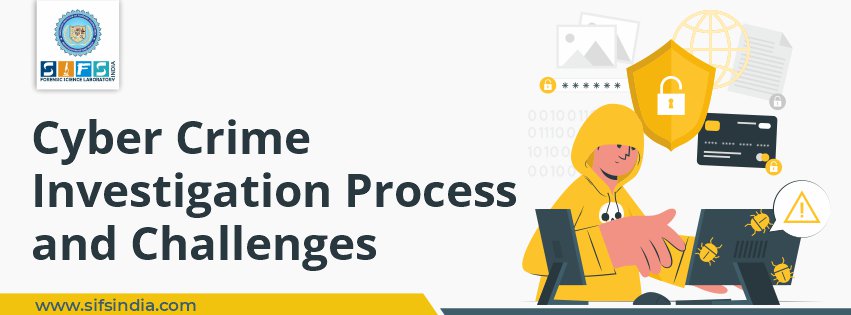Cyber forensic investigation is the process of collecting, analyzing, and preserving electronic data in order to investigate cyber crime.
It is the process of investigating computer systems, networks, and digital devices to identify and gather evidence of cyber crime.
Cyber forensic investigation is a critical component of any cyber security strategy, and it is essential for law enforcement agencies, private investigators, and cyber security professionals.
In this article, we will discuss about cyber crime investigation process, recent research ideas, and the future of cyber forensic investigation.
Importance of Cyber Forensic Investigation
Cyber crime is a significant threat to individuals, businesses, and governments around the world. Cyber criminals use a variety of techniques to steal sensitive information, commit fraud, and disrupt computer systems.
Cyber forensic investigation is critical in the fight against cyber crime because it allows investigators to gather evidence that can be used to identify and prosecute cyber criminals.
It is an essential tool for law enforcement agencies, private investigators, and cyber security professionals.
Recent Research Ideas
Recent research in the field of cyber forensic investigation has focused on developing new techniques and tools for collecting and analyzing electronic data.
One area of research is the development of artificial intelligence (AI) and machine learning algorithms that can analyse large amounts of data quickly and accurately.
These algorithms can identify patterns and anomalies in electronic data that may be indicative of cyber crime. Researchers are also developing new techniques for recovering data from damaged or corrupted devices, such as smartphones and hard drives.
Another area of research is the development of blockchain-based forensic tools.
Blockchain technology is a decentralized, distributed ledger that can be used to store and track information securely.
Researchers are exploring how blockchain technology can be used to create secure and transparent digital forensic investigations. This technology can help ensure that evidence is not tampered with and can be traced back to its original source.
Finally, researchers are exploring the use of virtual reality (VR) and augmented reality (AR) technologies for cyber forensic investigation.
These technologies can be used to create immersive environments that simulate crime scenes or digital environments.
Investigators can use VR and AR to explore digital crime scenes, analyse electronic evidence, and reconstruct events.
Cyber Crime Investigation Process
The process of cyber forensic investigation typically involves several stages, including evidence acquisition, analysis, and reporting.
During the evidence acquisition stage, investigators collect electronic data from a variety of sources, such as computers, smartphones, and other digital devices. This data is then analysed using specialized tools and techniques to identify and extract relevant information.
During the analysis stage, investigators examine the electronic data to identify patterns and anomalies that may be indicative of cyber crime. They also analyse metadata, such as date and time stamps, to create a timeline of events. Investigators may also use forensic tools to recover deleted data or extract information from damaged or corrupted devices.
Finally, investigators prepare a report summarizing their findings and presenting their evidence. This report may be used in court to prosecute cyber criminals or to support civil lawsuits.
Challenges in Cyber Forensic Investigation
Cyber forensic investigation presents several challenges, including the volume and complexity of electronic data, the rapid pace of technological change, and the need for specialized skills and expertise.
The sheer volume of electronic data generated by modern computer systems and networks can be overwhelming, and investigators must be able to sort through this data quickly and efficiently.
The rapid pace of technological change also presents a challenge for cyber forensic investigation. New technologies and devices are constantly being developed, and investigators must be able to keep up with these changes in order to collect and analyse electronic data effectively.
Finally, cyber forensic investigation requires specialized skills and expertise that are not commonly found in law enforcement or other organizations.
Investigators must have a deep understanding of computer systems, networks, and digital devices, as well as specialized training in forensic techniques and tools.
Conclusion
Cyber forensic investigation plays a critical role in identifying, analyzing, and mitigating cyber threats. With the increasing use of technology, cyber crime has become more sophisticated and complex, and cyber forensic investigators must keep up with the latest technological advancements to uncover digital evidence.
Recent research ideas in cyber forensic investigation, including the integration of blockchain technology and AI, provide promising solutions to enhance the efficiency and effectiveness of the investigation process.
Blockchain technology can provide secure and tamper-proof evidence that can be verified and authenticated by legal authorities, while AI-based tools can automate the analysis of large volumes of digital data, reducing the time and effort required for manual analysis.
Cloud forensics is another emerging area of research that focuses on the collection, analysis, and preservation of digital evidence from cloud-based systems and services.
Research in this area has focused on developing tools and techniques to analyse cloud-based data, including data stored in SaaS, PaaS, and IaaS environments.
The importance of cyber forensic investigation is further highlighted by the increasing number of cyber-attacks worldwide.
Cyber crime has become a major threat to businesses and individuals, and the damage caused by cyber-attacks can be significant, including financial loss, reputation damage, and legal consequences.
Cyber forensic investigation plays a critical role in identifying the scope of cyber-attacks, the extent of the damage, and the perpetrators behind it.
Proper referencing and authentication of content are essential in cyber forensic investigation, and investigators must follow standard procedures to ensure the accuracy and reliability of digital evidence.
Cyber forensic investigators must also keep up with the latest legal and regulatory requirements to ensure that digital evidence is admissible in court cases.
In conclusion, cyber forensic investigation is a critical process in digital forensics that helps identify, collect, analyse, and preserve digital evidence to uncover the details of cyber crime incidents.
Recent research ideas in cyber forensic investigation, including blockchain technology, AI, and cloud forensics, provide promising solutions to enhance the efficiency and effectiveness of the investigation process.
The importance of cyber forensic investigation is further highlighted by the increasing number of cyber-attacks worldwide, and cyber forensic investigators must follow standard procedures to ensure the accuracy and reliability of digital evidence.
With the increasing use of technology, cyber forensic investigation is expected to become more complex and sophisticated, and cyber forensic investigators must keep up with the latest technological advancements to uncover digital evidence and mitigate cyber threats effectively.

 September 17, 2023 - BY SIFS India
September 17, 2023 - BY SIFS India